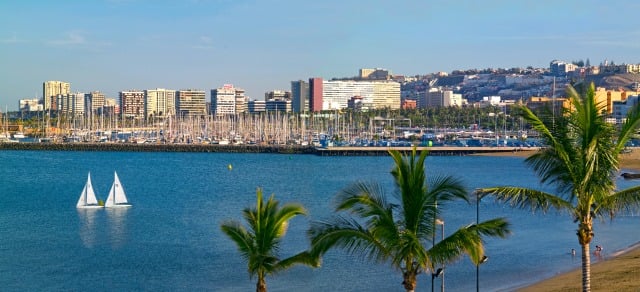“This is the right moment to start a business here,” says half-Swedish-half-Canario Gabriel Alzola.
“There are more tourists than ever, spending more money than ever. If you have a good idea it could really work here. I see opportunities every day.”
And no-one knows the island’s potential better than Gabriel, who has run a successful real estate franchise there since 2013.
He even credits his very existence to Gran Canaria’s booming tourism industry.
“My mother went to Gran Canaria in 1956 and started working as the first female tour guide. She fell in love with a local guy, they married, and I was born in ‘63,” he explains.
 Gabriel Alzola has run a business in Gran Canaria for four years now
Gabriel Alzola has run a business in Gran Canaria for four years now
Gabriel and his parents moved to Sweden when he was 12 years old, but before long he found himself back in Gran Canaria. At 19 he followed in his mother’s footsteps, working as a tour guide on the island before spending several years in various hospitality roles.
When he met his wife, a Swede from Gothenburg, he yo-yoed back up to Sweden where he spent the next two decades working in his father’s Spanish law offices. Together they helped several thousand Swedish families deal with their properties in Spain, assisting them with everything from property deed and emigration issues to property inheritance.
Since 1992, Gabriel has been registered as a real estate agent by the Swedish authorities. Four years ago he was asked by Fastighetsbyrån, Sweden’s leading real estate agency chain, if he wanted to be the franchise owner for Gran Canaria.
“I thought about it and knew it was exactly what I wanted to do. It’s like everything I’ve done my whole life has led to this. So for the past four years I’ve been flying between Sweden and Gran Canaria. We currently have two offices, and will open the third in Las Palmas later this year.”
 Las Palmas. Photo: Matti Mattila/Creative Commons
Las Palmas. Photo: Matti Mattila/Creative Commons
Gabriel has the obvious advantage of speaking the local language; however, he says non-Spanish speakers shouldn’t be put off starting a business in Gran Canaria.
“Speaking Spanish does make things easier, but it’s not impossible and in Spain, we’re prepared for this. You can hire a gestor, whose job it is to help you set up a company. It’s great value for money and they take care of everything, so you don’t have to worry about a thing.”
There are also some very enticing tax and investment concessions. The corporate tax for businesses that set-up within the Canary Islands Special Zone (ZEC) is only four percent, staggeringly low compared with the 20 to 25 percent paid by businesses across much of the rest of Europe.
Furthermore, The Canary Islands Investment Reserve (RIC) reduces the tax burden by up to 90 percent of the company’s profits — provided certain investments linked to company growth are made.
And that’s just a snapshot of the many incentives offered to people interested in investing or starting a business in Gran Canaria. Various factors contribute to burgeoning business development on the island, from the growing regional market to a talent pool packed full of educated young people. Add to that the ready availability of offices and coworking spaces and speedy broadband connection in the main urban centres.
But choosing to up sticks and set up a company in Gran Canaria is about more than financial gain.
 Photo: MonicaVolpin/Pixabay
Photo: MonicaVolpin/Pixabay
From the weather to the abundance of things to do, the whole island is built for both business and pleasure. With an average temperature of 23 degrees, nearly 5,000 hours of sunshine a year, a moderate cost of living, and plenty of things to do, Gabriel believes it’s the ideal place to live as well as work.
“This island is incredible, there are all kinds of activities. It’s big, so there are different climates from north to south, which means there’s something for everyone. Besides the beach, you have walks in the mountains, a lot of beautiful treks, loads of watersports, and a wonderful countryside to experience.
“Life is more laidback here, it’s not as stressful as it is on the mainland in places like Madrid or Barcelona. Friends from those places are jealous of us, they think we’re the beachfront people. It’s like California, we do a lot of surfing, it’s a beach life.”
 Photo: FrodeCJ/Pixabay
Photo: FrodeCJ/Pixabay
And don’t be fooled by its relative insularity, Gran Canaria is surprisingly well-connected. The Airport of Gran Canaria connects the island with over 100 destinations in Spain, the rest of Europe, and Africa.
Furthermore, the port in its buzzing capital, Las Palmas, is connected to over 180 ports around the world. The city itself is international, packed full of restaurants, cafes, bars, nightclubs, and great shopping with a wonderfully low VAT rate of just 7 percent.
If all of this sounds too good to be true…it isn’t. So if you’re thinking about setting up a business as well as experiencing a different culture and lifestyle, Gran Canaria might just be the perfect place for you.
“I really encourage people to move here and set up a business,” says Gabriel. “This is a wonderful place to live, and there’s great business potential. Moving out here is life-changing.”



 Please whitelist us to continue reading.
Please whitelist us to continue reading.